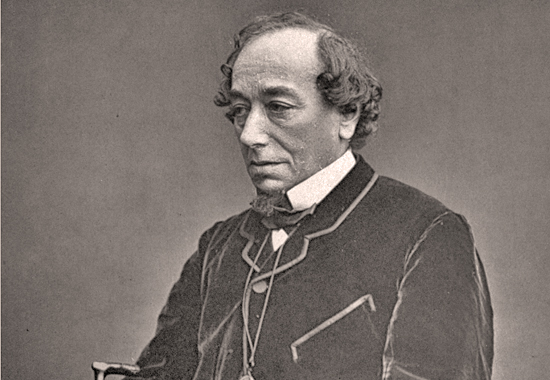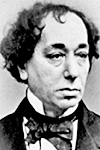|

THE CAUSE OF THE PEOPLE, THE CAUSE
OF ENGLAND - DISRAELI 1846
The Cause of England
It follows an excerpt from the transcript of
Benjamin Disraeli's The Cause of England speech, delivered at
London, England — May 15, 1846.

 |
Now, sir, |
I must say in
vindication of the right honorable gentleman
that I think great injustice has been done to
him throughout these debates. A perhaps
justifiable misconception has universally
prevailed.
Sir, the right
honorable gentleman has been accused of foregone
treachery — of long-meditated deception — of a
desire unworthy of a great statesman, even if an
unprincipled one of always having intended to
abandon the opinions by professing which he rose
to power.
Sir, I entirely
acquit the right honorable gentleman of any such
intention. I do it for this reason, that when I
examine the career of this minister, which has
now filled a great space in the parliamentary
history of this country, I find that for between
forty and fifty years that right honorable
gentleman has traded on the ideas and
intelligence of others. His life has been one
great appropriation clause. He is a burglar of
others' intellect. Search the index of Beatson
from the days of the Conqueror to the
termination of the last reign, there is no
statesman who has committed political petty
larceny on so great a scale.
I believe,
therefore, when the right honorable gentleman
undertook our cause on either side of the House
that he was perfectly sincere in his advocacy;
but as in the course of discussion the
conventionalisms which he received from us
crumbled away in his grasp, feeling no creative
power to sustain men with new arguments, feeling
no spontaneous sentiments to force upon him
conviction, the right honorable gentleman —
reduced at last to defending the noblest cause,
one based on the most high and solemn
principles, upon "the burdens peculiar to
agriculture" — the right honorable gentleman,
faithful to the law of his nature, imbibed the
new doctrines, the more vigorous, bustling,
popular and progressive doctrines, as he had
imbibed the doctrines of every leading man in
this country for thirty or forty years, with the
exception of the doctrines of parliamentary
reform which the Whigs very wisely led the
country upon and did not allow to grow
sufficiently mature to fall into the mouth of
the right honorable gentleman.
Sir, the right honorable gentleman tells us that
he does not feel humiliated. Sir, it is
impossible for anyone to know what are the
feelings of another. Feeling depends upon
temperament: it depends upon the idiosyncrasy of
the individual: it depends upon the organization
of the animal that feels. But this I will tell
the right honorable gentleman, that, though he
may not feel humiliated, his country ought to
feel humiliated. Is it so pleasing to the
self-complacency of a great nation, is it so
grateful to the pride of England, that one who
from the position he has contrived to occupy
must rank as her foremost citizen, is one of
whom it may be said, as Dean Swift said of
another minister, "that he is a gentleman who
has the perpetual misfortune to be mistaken"?
And, sir, even
now, in this last scene of the drama, when the
party whom he unintentionally betrayed is to be
unintentionally annihilated — even now, in this
the last scene, the right honorable gentleman,
faithful to the law of his being, is going to
pass a project which I believe it is matter of
notoriety is not of his own invention. It is one
which may have been modified, but which I
believe has been offered to another government
and by that government has been wisely rejected.
Why, sir, these are matters of general
notoriety. After the day that the right
honorable gentleman made his first exposition of
his schemes, a gentleman well known to the
House, and learned in all the political secrets
behind the scenes, met me and said,
"Well, what do
you think of your chief's plan?"
Not knowing exactly what to say, but taking up a
phrase which has been much used in the House, I
observed,
"Well, I
suppose it is a great and comprehensive
plan."
"Oh!" he
replied, "we know all about it; it was
offered to us. It is not his plan; it's
Popkins's plan."
And is England to be governed by Popkins's plan?
Will he go to the country with it? Will he go
with it to that ancient and famous England that
once was governed by statesmen — by Burleighs
and by Walsinghams; by Bolingbrokes and by
Walpoles; by a Chatham and a Canning — will he
go to it with this fantastic scheming of some
presumptuous pedant?
I won't believe
it. I have that confidence in the common sense,
I will say the common spirit, of our countrymen,
and I believe they will not long endure this
huckstering tyranny of the Treasury Bench —
those political peddlers that bought their party
in the cheapest market and sold us in the
dearest.
I know, sir, that there are many who believe
that the time is gone by when one can appeal to
those high and honest impulses that were once
the mainstay and the main element of the English
character. I know, sir, that we appeal to a
people debauched by public gambling — stimulated
and encouraged by an inefficient and
shortsighted minister. I know that the public
mind is polluted with economic fancies: a
depraved desire that the rich may become richer
without the interference of industry and toil. I
know, sir, that all confidence in public men is
lost. But, sir, I have faith in the primitive
and enduring elements of the English character.
It may be vain
now, in the midnight of their intoxication, to
tell them that there will be an awakening of
bitterness; it may be idle now, in the
springtide of their economic frenzy, to warn
them that there may be an ebb of trouble. But
the dark and inevitable hour will arrive. Then,
when their spirit is softened by misfortune,
they will recur to those principles that made
England great, and which, in our belief, can
alone keep England great. Then, too, perchance
they may remember, not with unkindness, those
who, betrayed and deserted, were neither ashamed
nor afraid to struggle for the "good old cause"
— the cause with which are associated principles
the most popular, sentiments the most entirely
national, the cause of labor, the cause of the
people — the cause of England.

More History
|